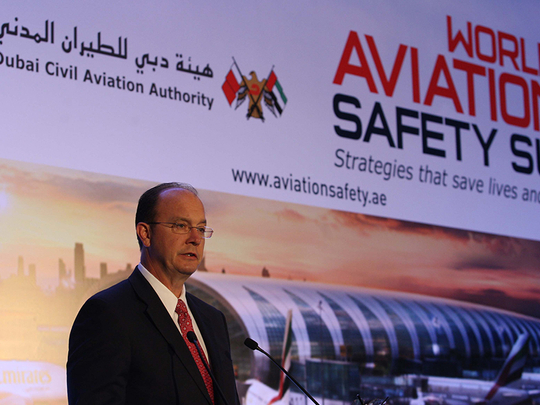
Dubai: The UAE and Qatar are “key markets” for Boeing, the US plane makers Middle East President, Jeff Johnson, said on Monday, a day before Emirates and Etihad Airways are expected to address subsidy allegations in the US.
The US’ largest airlines, Delta, United and American, want the White House to take a look at the financials of Emirates, Etihad Airways and Qatar Airways, which they say have benefited from over $40 billion in government subsidies since 2004.
The airlines are calling on the US government to change its open skies agreement with the UAE and Qatar over the alleged subsidies.
Emirates President Tim Clark is expected to refute the allegations at a press conference in Washington DC on Tuesday.
Etihad Airways President and Chief Executive, James Hogan, is also expected to address the allegations at an aviation event on the same day in the US capital. Both carriers, along with Qatar Airways, have historically denied they benefit from state subsidies.
Top plane buyers
“They’re [UAE and Qatar] key markets for us historically and I think going forward they’re both in the top ten for Boeing,” Johnson told reporters at the World Aviation Summit in Dubai.
The three Gulf carriers are huge customers for Boeing, purchasing 477 long-haul aircraft over the period they are alleged to have taken in over $40 billion in state subsides.
“In the Middle East, we’re pushing close to 70 per cent of market share in the twin aisle (long-haul aircraft), so we’ve really had great success here,” Johnson said.
He, however, declined to involve himself in the debate when asked if Boeing was cautious the three Gulf carriers could use their huge aircraft orders as a bargaining chip in the dispute. Emirates and Qatar Airways have previously questioned why they would purchase US made aircraft if they are restricted from flying to the country.
But Boeing does not expect any change in the open skies policy, which it said last month benefits their business.
“We’re a firm believer in open skies,” Johnson said.
“It’s the right thing to do for the airlines, for the government [and] for the people flying” he added.
A change in the open skies agreement would be arduous, analysts say.
“The ramifications would go well beyond the agreements themselves given the complex economic linkages related to air services including the number of direct and indirect jobs dependent upon them,” said John Strickland, Director of JLS Consulting, by email.
Another analyst labelled calls to change the open skies agreement as “nonsense.”
“Changing an air service agreement on this scale is unprecedented,” said Will Horton, senior analyst at CAPA — Centre for Aviation, by email.
The US carriers lament that the alleged state subsidies allow Gulf airlines to eat at their market share. The Gulf carriers have hit back stating that they offer US, and non-US passengers, connections to countries that are not served by Delta, United or American.
“It’s not farfetched to think Gulf carriers in the medium-term could double their US presence,” said Horton.
Emirates currently flies to nine destinations in the US, Etihad Airways six and Qatar Airways three.











